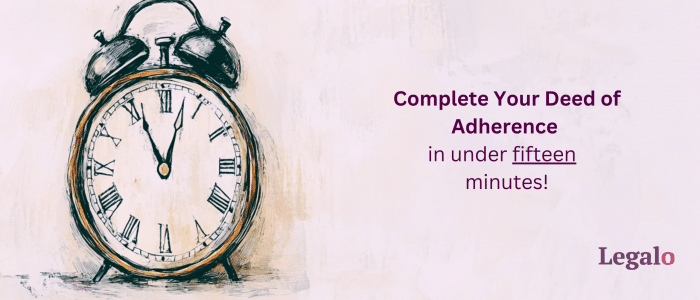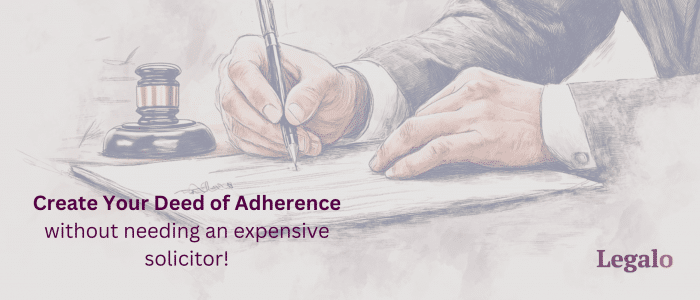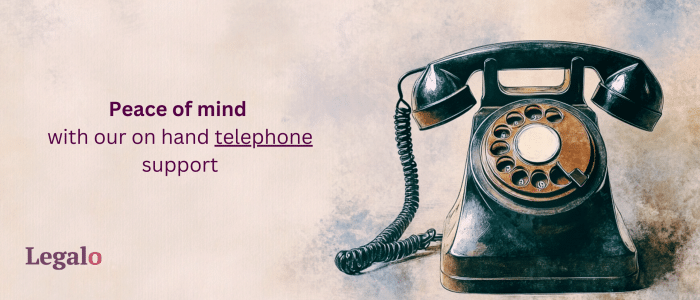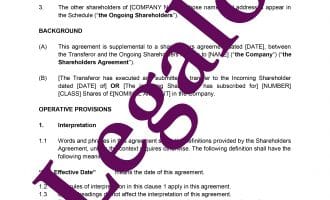Deed of Adherence
Our Deed of Adherence Template:
- Protects minority and majority shareholders
- Drafted by an expert UK solicitor
- Includes full guidance notes
- Use with any UK company
- Free telephone support

How Does It Work?
-
1. Download
-
2. Edit
-
3. Print
-
4. Sign
The deed of adherence template that you can download from this page was drafted by me, David. I am a practising Solicitor and co-founder of Legalo.
A Deed of Adherence to a shareholders agreement is a legal document that you use when a new shareholder joins an existing shareholders’ agreement or alternatively an investment agreement.
The deed of adherence operates to make sure that the new shareholder is subject to the same terms and conditions as the existing shareholders.
You need a deed of adherence in this case, because the new shareholder was not a party to the original contract. Unless you use the deed of adherence, the new shareholder cannot enjoy, or be subject to, the terms of the original shareholders agreement. This is due to the legal rule called “privity of contract“. (For more information, see Wikipedia.)
The deed also acts to the advantage of the incoming shareholder because it ensures that the new shareholder will also benefit from the same rights as the existing shareholders under the terms of the shareholders’ or investment agreement.
If you bring in a new shareholder without a deed of adherence, then the incoming shareholder will not be bound by any of the terms of the existing shareholder or investment agreement – which is never a good idea!
The Deed of Adherence serves as a vital mechanism to safeguard the company’s governance structure. Without it an incoming shareholder will not be subject to the terms of the existing shareholders or investment agreement. This can cause operational and legal problems at a later stage.
This template deed of adherence is for when a new shareholder receives shares in a limited company that already has a shareholder agreement in place.
Using our Deed of Adherence Template

You can purchase our template deed of adherence and then download it in Word format to your computer. Once downloaded you can edit the template to produce your final document.
I have drafted the deed of adherence so that it is very simple to complete. On average it takes our customers about 15 minutes to complete the deed of adherence.
The template deed comes with a full written guide to completing it, which I also prepared. If you have any questions when completing the Deed of Adherence you can call our customer support line. You will come through to me, David, and I will happily guide you with issues about completing the deed, and any other questions that you may have relating to the document.
Please note that the document is in the format of a ‘Deed’. This has implications when it comes to signing the document. It means that the parties must have a witness (an independent adult person) observe them sign the document. The witness will then also need to sign the document.
Under UK law, you can sign a Deed with ‘wet ink’, i.e. the traditional print and sign way. Alternatively, you can sign it electronically using any suitable service, such as DocuSign or Adobe Sign. For the latter, you still have to have your witness physically present with you (i.e. in the same room) when you sign the deed electronically, so it is not any simpler.
When to use a Deed of Adherence

As I mentioned above, you typically need a Deed of Adherence when a company issues new shares or when a shareholder sells existing shares to a new party. The existing shareholders are likely to require that the new new shareholder is to be subject to the company’s existing shareholders’ agreement or investment agreement.
I’ll set out below the most common situations that give rise to the need to put a deed of adherence in place.
All of the scenarios below assume that the company has an existing shareholders or investment agreement.
1. Issuing of New Shares
When a company issues new shares to investors or other individuals, those new shareholders should, ideally, become parties to the existing shareholders’ agreement. The only way to achieve this is by the incoming shareholder signing a deed of adherence.
The Deed of Adherence will reference the existing shareholders agreement and it ensures the new shareholders are subject to the terms of that agreement. This then ensures that you maintain the balance of rights and responsibilities among all parties.
2. Transfer of Existing Shares
One reason that you may have a new shareholder who you need to add could be that a shareholder has sold their shares. The buyer of the shares would then become the new shareholder, and you would have to add them through the Deed of Adherence.
It is common for a shareholders agreement to state that if an existing shareholder sells or transfers their shares to another person, the company will only register the buyer as a shareholder once they have signed a deed of adherence.
This is a very common restriction. It operates to protect the company from having a new shareholder who could undermine the agreed governance and operational framework if they have not signed up to the deed of adherence.
3. During Funding Rounds
In the context of investment agreements, when new investors join during a funding round, they must agree to sign up to the terms already agreed between the company and its existing investors.
A Deed of Adherence will ensure uniformity in the agreement’s provisions, especially regarding matters such as voting rights, liquidation preferences, and exit strategies.
4. Mergers, Acquisitions, or Reorganisations
When companies undergo restructuring, mergers, or acquisitions, you may use a Deed of Adherence to ensure that any new shareholders who join as part of that process comply with the pre-existing agreements governing the company’s operations, as set out in its existing shareholders agreement.
Missing share certificate?
If you are transferring shares but have lost the share certificate, then we have a deed of indemnity for the missing share certificate for you to use.
Key Elements of a Deed of Adherence
To be effective, it is critical that a Deed of Adherence includes the key elements that I will set out below. If it does not, then it may not be legally valid as a document, or it may fail to achieve its purpose of binding the incoming shareholder to the terms of the existing shareholders or investment agreement.
I will set out below the critical parts of a deed of Adherence.
You can rest assured that our template, having been drafted by me, and me being a qualified solicitor with 30 years of experience, contains all of these elements.
1. Identification of Parties
Naturally, it is absolutely critical that the Deed correctly and clearly identifies all the parties involved. These will be:
- The Company: i.e. the entity to which the shareholders’ agreement or investment agreement pertains.
- The Existing Shareholders: In most cases, all existing shareholders will be signatories, ensuring they agree to the inclusion of the new shareholder.
- The New Shareholder: The individual or entity acquiring the shares and agreeing to be bound by the terms of the original agreement.
2. Reference to the Original Agreement
A valid Deed of Adherence must explicitly reference the original shareholders’ agreement or investment agreement, identifying it by name and date and the parties that are party to it. E.g. ‘the shareholders agreement relating to the company dated 16th January 2025 between [name of each original shareholder]’. This ensures there is no ambiguity about which agreement the new shareholder is becoming a party to.
3. New Shareholder’s Rights and Obligations
The Deed must set out clearly that the new shareholder will inherit the same rights and obligations as the existing shareholders. These may include:
- The right to vote at shareholder meetings.
- The obligation to comply with the company’s share transfer restrictions. For example, pre-emption rights.
- Provisions for dividend distribution, and return of capital.
- Participation in any buyout, sale, or liquidation event.
4. Governing Law and Jurisdiction
It is essential that the Deed specifies the country whose governing law will apply to the deed of adherence. Typically this will be English law for companies operating in the UK. Otherwise the document will be subject to the complicated laws on applicable law.
This is the case for the template that I have prepared and which you can purchase and download. Additionally, the deed should include a clause about jurisdiction, identifying the courts where any disputes will be resolved. Again, in our template this is set as the courts of England and Wales.
Explore Our Deed of Adherence Template
To view a sample of our template deed of adherence click on the ‘preview’ button at the top right of this page. Below, I explain by reference to their number the clauses in our deed of adherence template.
1. Interpretation of the Deed
This clause defines the main terms used in the agreement. This is brief in this agreement, because the shareholders agreement will have already defined most of the terms used.
2. Adherence to the Shareholders Agreement
This is the main clause, which states that the new shareholder has had a copy of the shareholders agreement (please ensure this happens) and, by his taking over the transferor’s rights and obligations, then he agrees to be bound by it. In clauses 2.1.2 and 2.1.3, keep the first option in each case if you are transferring shares, or keep the second option in each case if you are issuing new shares, and then delete the options that do not apply.
3. No release of obligations
This provides that the transferor is not let off any liability he already has. For example, if he has breached the Shareholders Agreement, then he would remain liable for that. If, instead of a transfer of shares, you are issuing new shares, then delete the whole of clause 3.
4. Counterparts of this Deed of Adherence
Because you must sign this agreement as a deed, this clause provides that you can have sufficient prints of it signed by each party separately and held by the other parties if you wish. In other words, they don’t all have to sign the same physical print.
5. Rights of third parties to this deed
This clause excludes the Contracts (Rights of Third Parties) Act 1999 from applying to the agreement, so that only the parties to the agreement can enforce it.
6. Law and jurisdiction
If any party is based abroad, then you may wish to change the jurisdiction clause to reflect this and/or make it non-exclusive. Otherwise, leave it as the UK.
The Schedule to this Deed of Adherence
In the schedule, insert the details for the ongoing shareholders’ names and addresses, as mentioned above.
The Benefits of Using Our Deed of Adherence Template

Using a well-drafted Deed of Adherence template provides many benefits, ensuring you have a legally sound document that can be easily customised to your company’s specific needs. Here are the key advantages of using our template:
Saves Time
Drafting legal documents from scratch is not a good idea, unless you have extensive legal experience. If you don’t have the relevant experience, there is a high risk that you get something wrong and the deed is ineffective. It will also be time-consuming, especially if you’re not familiar with the required legal wording and document structure. Our template simplifies the process, allowing you to create a legally-compliant Deed in just a few minutes.
Cost-Effective
Hiring a solicitor to draft a Deed of Adherence for you is going to be moderately expensive. On average you can expect to pay between £300 and £500 plus VAT. Perhaps not an issue if you are a large PLC, but for startups or small businesses you are likely to want to avoid such cost where you can. Our template offers the same legal reliability at a fraction of the cost, without compromising on quality.
Legally Compliant
David drafted this template. David is an experienced solicitor with extensive experience in corporate and commercial law. You get peace of mind that the document complies with the relevant provisions of English law and will hold up if ever challenged.
Customisable
Our template is flexible and easy to edit. It comes with a detailed set of guidance notes that walk you through each step in customising the template deed of adherence. Whether you’re dealing with a simple share transfer or a complex investment arrangement, you can easily tailor the Deed to suit your specific requirements.
Free telephone Support
I personally manage our customer support line, and you can call me at any time between 9am and 5pm if you have any questions completing the template.
My Guide to Using the Deed of Adherence Template

I’ll set out below the simple steps to follow to make sure that your completed deed of adherence is executed properly and legally valid:
Step 1: Purchase and Download our Template
Purchase the Deed of Adherence template, and download it to your computer, or tablet. The template is provided in Microsoft Word format.
Step 2: Fill in the Relevant Details
Being in Word format, the template deed is fully editable. You will need to complete the template by inserting the following details:
- Parties to the Deed: Include the names and details of the company, existing shareholders (if necessary), and the new shareholder.
- Original Agreement Reference: Clearly reference the shareholders’ agreement or investment agreement, including its title and date.
- Shareholder’s Rights and Obligations: Outline the rights and obligations being transferred to the new shareholder.
Step 3: Execution of the Deed
For the Deed to be valid, all relevant parties must sign it in the presence of a witness. Make sure the company, the new shareholder, and any necessary existing shareholders sign the document correctly. Under English law a company can sign a deed by one director signing and that director’s signature being witnessed, or by two directors signing for the company. See the Government guidance on companies signing deeds for further information. For the individual shareholders, each shareholder’s signature must be witnessed.
Step 4: Retain the Executed Deed for Future Reference
After the Deed is executed, it is very important that you retain a signed copy alongside the original shareholders’ agreement. Ideally, you should also send an electronic copy to all shareholders for their records. This ensures that in the event of any future disputes or transactions, all relevant parties are clear on the terms.
Common Mistakes to Avoid

I’ll set out below some common errors that can render a Deed of Adherence legally ineffective or lead to disputes. Hopefully, this will help you make sure that you avoid them.
1. Failure to Reference the Original Agreement
If you do not correctly reference the original shareholders’ agreement or investment agreement in the Deed, there may be confusion or ambiguity about which terms apply to the new shareholder. Always double-check that you have accurately described the agreement.
2. Missing Signatures
Missing signatures is the most common error that I see with this kind of document. A Deed of Adherence is not legally binding unless it is signed by all relevant parties. Make sure that that the company, the new shareholder, and all of the existing shareholders (if required) sign the document.
3. Unclear or Incomplete Terms
If the terms of the deed are not clear, then you create a recipe for issues in the future. Vague or unclear terms in the Deed can lead to misunderstandings and questions over what was actually meant. It’s very important that you clearly draft the deed of adherence.
4. Failure to Execute the Deed Properly
This is, in my experience, the most common mistake made. For the Deed to be valid, it must be executed according to the legal requirements under English law. I.e. all the individual shareholders must have their signature witnessed, and in the case of the company either two directors must sign, or one director in the presence of a witness.
Legal Considerations and FAQs

I’ll cover below the most common questions that I see raised relating to a deed of adherence.
If you have a question and it is not covered below, please contact me by email or telephone.
What is a deed of adherence in the UK?
A deed of adherence is a legal document that operates to join a new shareholder (or investor) an existing shareholder or investment agreement. It confirms the new party’s ‘adherence’ to the terms of the original agreement.
What is in a deed of adherence document?
In a deed of adherence document, you will typically find:
- a statement that the new party joins the existing contract;
- a note that all the existing parties to the contract agree to accept the new party; and
- that the new party agrees to abide by its terms.
The deed of adherence document should not change any terms of the existing contract.
Is a Deed of Adherence Legally Binding?
Yes, provided that a Deed of Adherence has been properly executed by all relevant parties, then it will be legally binding. It will then operate so that the new shareholder is fully bound by the terms of the original shareholders’ agreement (or investment agreement).
Who signs a deed of adherence?
A new party who is joining an existing shareholder or investment agreement would need to sign a deed of adherence document, to acknowledge their acceptance of the outlined terms and conditions, and commit to adhering to them. The existing parties also need to sign the deed of adherence, to show that they agree to the new party’s joining as a party to their existing contractual arrangement.
Does a Deed of Adherence Need to be Witnessed?
Yes, because the document is in the form of a ‘deed’, then, to be legally valid, there must be a witness to each signature by the individual shareholders. For the company there is the option for either:
- one director to sign on behalf of the company in the presence of a witness, or
- two directors both to sign.
Who can witness a deed of adherence?
A witness to a deed of adherence must be independent and not directly involved with the shareholder of investment agreement. They need to be of adult age and of sound mind, and must not benefit in any way from the deed to ensure that they are a neutral party. Spouses of a signatory can sign but it is generally considered preferable that the witnesses are not related to any of the parties. The witness must be 18 years old or older.
Can a Deed of Adherence Be Used for Both Shareholders and Investors?
Yes, you can use a Deed of Adherence to bind new shareholders or investors to the terms of either a shareholders’ agreement or an investment agreement. In this context both ‘non investor’ shareholders and ‘investor’ shareholders are still both shareholders. It is commonly used in both scenarios. In both cases it serves the same function of ensuring consistency in the legal rights and obligations of all parties.
What Happens if a Shareholder Refuses to Sign the Deed of Adherence?
If a new shareholder refuses to sign the Deed of Adherence, the terms of the original agreement will not be binding on them. To protect against this situation, it is common for shareholder and investment agreements to provide that the company will not register a new shareholder unless they first sign the deed of adherence.
Do I Need to File the Deed of Adherence at Companies House?
No, you do not need to file a deed of adherence at the company’s house. Like a shareholders or investment agreement, it is a private document between the company and its shareholders. Any changes to the company’s shareholding should, however, be updated on the company’s register of members. In some cases, you may need to update Companies House if the transfer of shares affects a person who the company should record as a ‘person with significant control’. This is anyone, or any entity, that owns over 25% of the shares in the company.
How Long Does It Take to Draft a Deed of Adherence?
Using our Deed of Adherence template, you can create a legally compliant document in approximately 15 minutes. It’s that quick! You simply need to complete the sections marked for adding your relevant information, review your draft document, then the document can be executed. This can be in either traditional ‘wet ink’ (i.e. hand signature) or electronically.
What is the difference between a deed of accession and a deed of adherence?
These mean the same thing in the context of a shareholders agreement. In the UK we normally refer to it as a “deed of adherence”. However, in Australia and New Zealand (and perhaps elsewhere) they usually call it a “deed of accession”.
In the UK, a deed of accession can also refer to the agreement under which a buyer of a business agrees to take over and abide by the terms of a UK pension scheme relating to the employees of the business.
What is a letter of adherence?
A letter of adherence is a brief written statement in which a new party expresses their agreement to adhere to the terms and conditions of an existing contract, generally being for a shareholders agreement. In essence it is the same as a deed of adherence, but generally in an abbreviated format. We recommend using a more comprehensive deed of adherence.
What is the difference between a deed and a contract?
There are three main differences between a deed and a contract:
Firstly, a deed must always be in writing.
Secondly, the signature of a person must always be witnessed. Where a company is a signatory either two officers (directors or the company secretary) must sign, or one director with an independent person witnessing their signature.
Thirdly, a deed does not require that each party receives something of value for it to be binding on them. A contract, on the other hand, does require that each party receives something of value. However, this does not necessarily have to be equal value or it can be monetary or an exchange of obligations.
What features make a deed legally valid?
A legally-valid deed typically requires the intention to create a binding legal agreement, competent parties of legal age and mental capacity, and that someone independently witnesses their signatures. The relevant parties must sign it, and deliver with intent for it to take effect.
Unsure Whether to Purchase Our Deed of Adherence Template?

If you have not yet decided whether to purchase our deed of adherence template, keep the following in mind:
- Drafted by a Solicitor: Unlike many of our online competitors, you get a template that a highly experienced solicitor has drafted. Qualified solicitors with deep expertise in corporate law have created our templates. This ensures that they meet the highest legal standards and are fully compliant with English law.
- Free Customer Service: Unlike most of our competitors, I am on hand for you to speak to if you have any questions relating to the document, either before or after you purchase it.
- Tailored for UK Law: I have specifically drafted the template for use in England and Wales, ensuring that it complies with UK regulations and business practices.
- Instant Download: Once purchased, you get immediate access to the document. This means you can sort it out today.
- Fully Customisable: The template is flexible and easy to modify, ensuring you can tailor it to the specific requirements of your transaction. As I have said, if you do find yourself with any questions when completing the template deed, you can call me at any time of the working day.
Purchase Your Deed of Adherence Template Now
Ready to add a new shareholder to your business? Our legally compliant and simple to use Deed of Adherence template is available for purchase and immediate download.
Click the purchase button at the top of the page so you can start.


